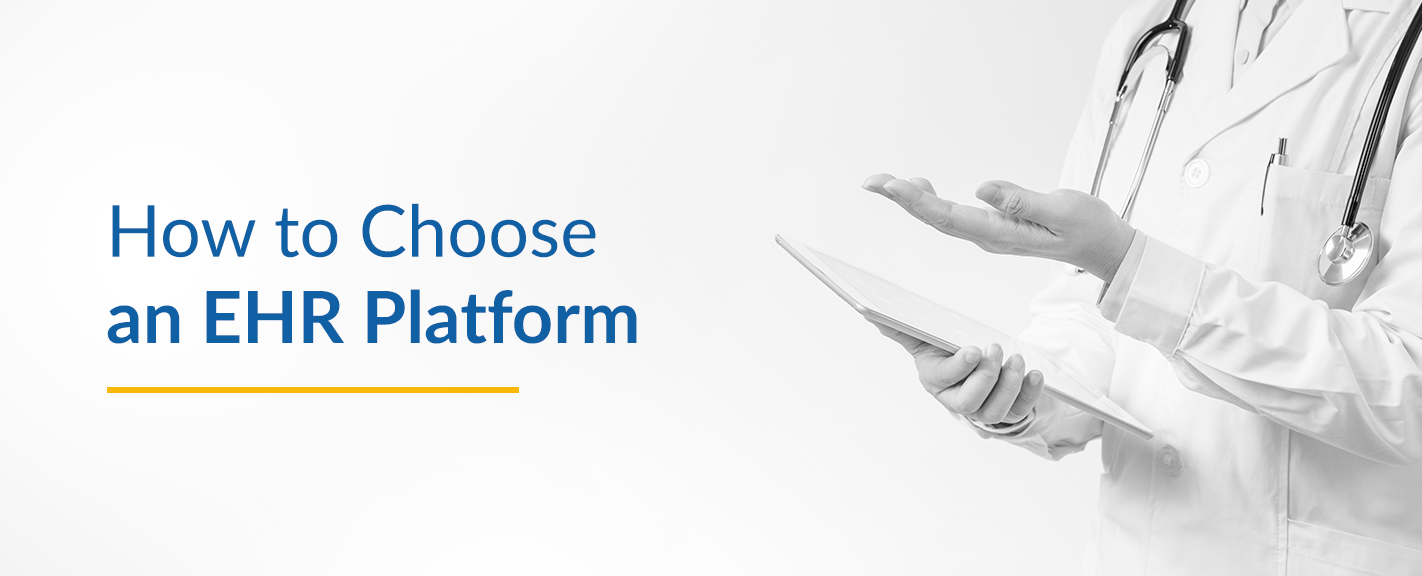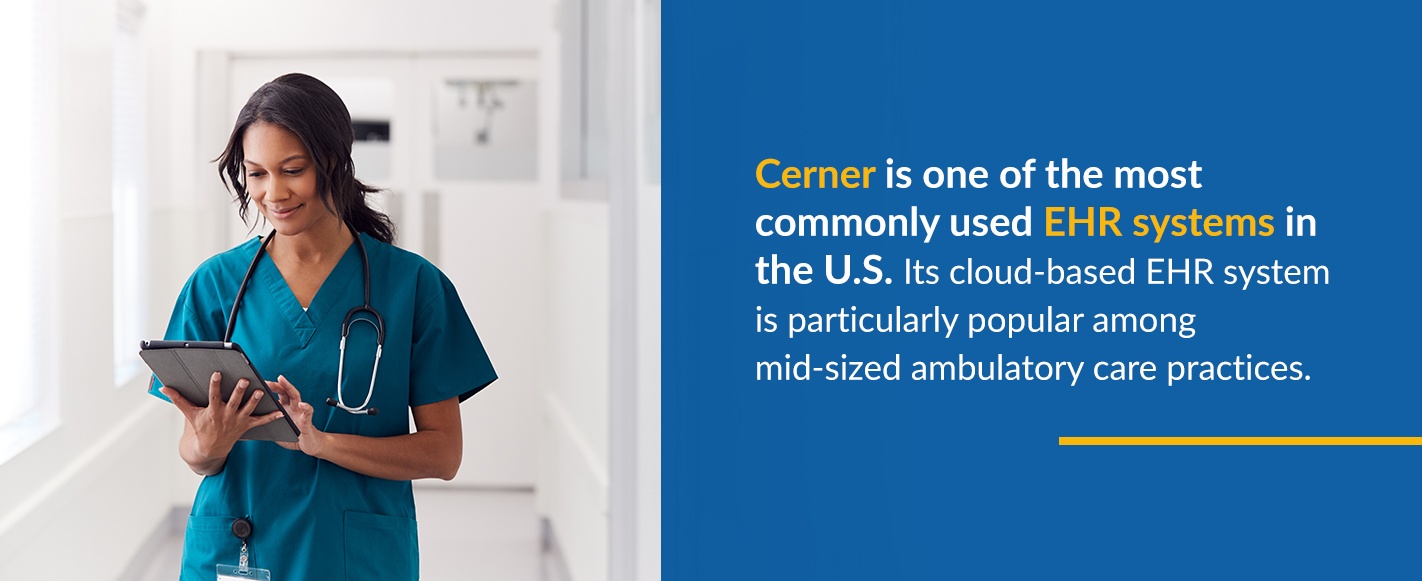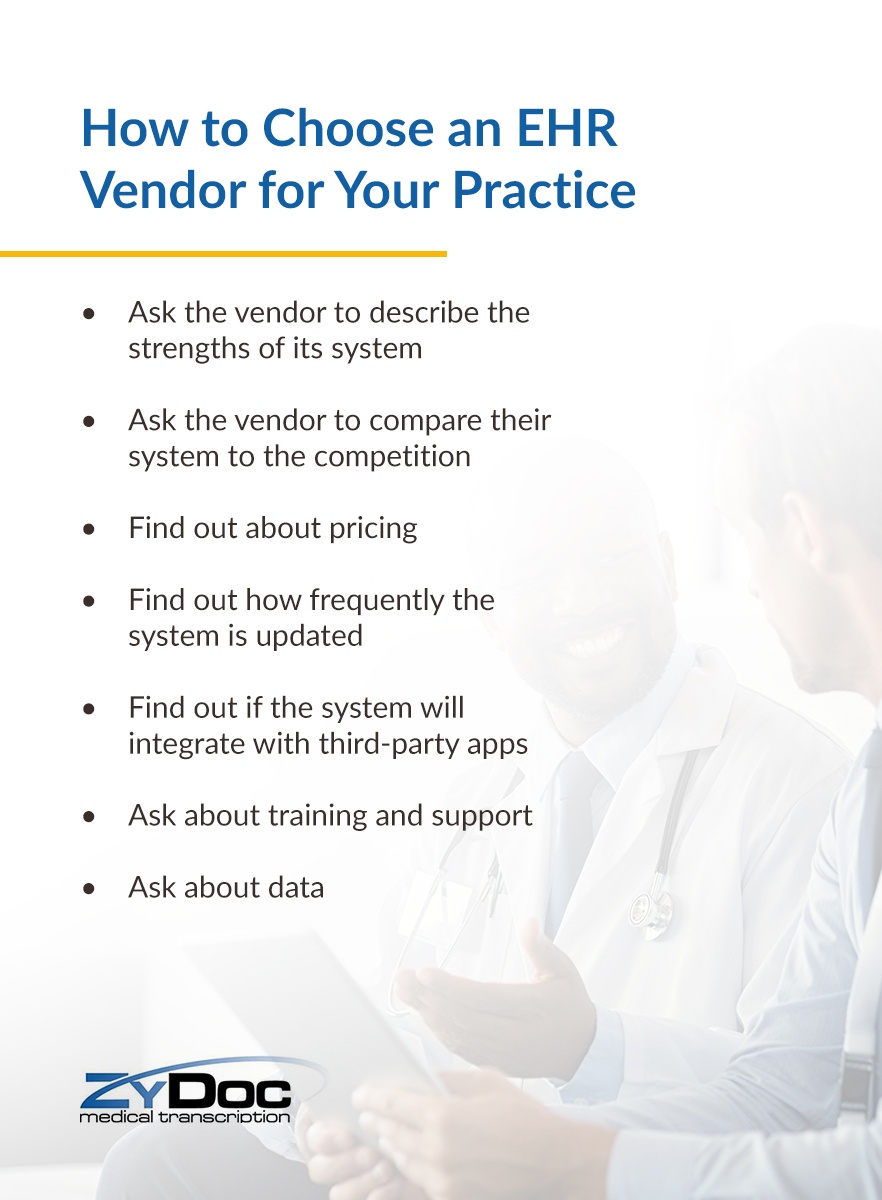How to Choose an EHR Platform
Nov 10, 2020 | Jonathan Maisel
An electronic health record (EHR) is the electronic version of a traditional paper chart. EHRs are collected in real-time and are designed to be more patient-centric compared to older methods of storing patient information. EHRs also go beyond the traditional chart in terms of the information they contain. A patient’s EHR can provide a big picture of their medical care, treatment and overall health.
Since 2015, medical providers and healthcare organizations have been required to use EHRs or face penalties such as reductions in Medicare and Medicaid reimbursement amounts. In addition to helping a medical practice or organization comply with the law and regulations, adopting an EHR offers many benefits, such as a reduction in medical errors and treatment delays. EHRs also help patients become more involved in their care and treatment.
Several types of EHR systems exist. There are some questions to ask when selecting an EHR for a new practice or when you are updating the EHR system at an established practice or organization.
Factors to Consider When Selecting an EHR Vendor
When you are figuring out how to select an EHR system, you need to consider many factors. As part of the EHR evaluation process, you want to think about how easy the system will be for your team to adopt as well as whether its features will work with your current needs. The quality of the vendor is another thing to consider as you make your EHR selection.
Think carefully about the following during the EHR vendor selection process:
- The size of your organization: The needs of a small, private medical practice will vary considerably from the needs of a large healthcare organization. Ask the vendor if the system can accommodate the number of providers your practice or organization has as well as the number of patients it sees and the specialties it offers.
- Your budget: Price is a big concern when you are choosing an EHR. You want an affordable system, but what affordable looks like can differ from organization to organization. It’s also worth remembering that some systems that look affordable upfront can cost more in the long run compared to systems that have a higher price. For example, an EHR system with a higher cost might include all the updates and customer support with that price. Meanwhile, a lower-cost system might charge your organization for every support call or to update the system as time goes on. Another thing worth remembering is that some lower-priced systems might not include all the options or features your organization needs.
- Whether the system is on-premises or cloud-based: An EHR system can be on-premises, meaning that the servers and hardware are located on-site at your practice or organization, or it can be cloud-based, meaning all of the information in the system is stored remotely. Cloud-based systems are usually less expensive than on-premises options. The vendor is responsible for maintaining all the technical aspects of a cloud-based system. While cloud-based systems are often ideal for many different types of medical practices or organizations, there are some cases when an on-premises EHR is the right call.
- Whether the EHR meets your needs today: It’s essential that the EHR you choose offers the functions you need today. The system should integrate with systems you use already or should be easy to connect with additional systems in the near future.
- Whether the EHR can meet your needs in the future: Ideally, the EHR system you pick will be able to grow with your organization. As you add more providers to your team, it should be easy to get them set up with the EHR. The same is true for on-boarding new patients. The vendor should be regularly updating the system to keep it aligned with current security protocols and to keep it up-to-date with the newest advances in technology.
- How easy is it to install updates: When there’s an update for the EHR system, what will your team need to do to install? Some systems expect customers to pay to get the latest version while others will automatically update their software. It’s worthwhile to find out what a software update will entail. Will the entire system be down and if so, for how long? When will the updates take place?
- The security features the EHR includes: When it comes to people’s private medical information, security should be a primary concern. Learn more about how each EHR system is kept secure and whether there have been security breaches in the past.
- Whether the EHR integrates with outside products and services: An EHR system that can communicate with other medical practices, pharmacies and labs in your area makes it easy to manage the health and care of patients. It’s also worthwhile to look for an EHR system that integrates with medical transcription services.
- The level of customer support provided by the EHR vendor: If there is a problem with the EHR, how easy is it to get in touch with a customer support representative? You might want to choose an EHR vendor that offers support when there is a concern as well as support if you have questions about the general operations of the system.
- Whether the EHR system is certified: An EHR system that certified by the ONC Health IT Certification Program meets the security and functionality requirements created by the Department of Health and Human Services.
Comparing the Main EHR Platforms

Some EHR systems are more well-known and regarded than other options. Looking closely at the specific features of the more established EHR vendors can help you choose the one that will work best for your healthcare organization or medical practice.
1. Allscripts
Allscripts is an open-platform EHR that is HIPAA-compliant and ONC-certified. There are multiple versions of the system. Allscripts Professional is best suited to small and mid-sized physicians’ offices and ambulatory care providers. Allscripts TouchWorks is designed to meet the needs of larger practices, such as multi-specialty practices.
The EHR can be cloud-based or on-premises. Its software was built to integrate easily with other programs and third-party applications. Once EHR information is in the system, providers and patients can access it, so care and treatment can be streamlined and the risk of medical errors reduced.
2. Athenahealth
Athenahealth bills itself as offering a network that is constantly evolving and updating to provide the best service to medical practices. The EHR system is cloud-based and features functions that are designed to increase provider efficiency all while improving the standard of care.
The target audience for athenahealth is large, multi-specialty healthcare organizations.
3. Cerner

Cerner is one of the most commonly used EHR systems in the U.S. Its cloud-based EHR system is particularly popular among mid-sized ambulatory care practices. One of the core features of Cerner is the fact that it uses the CommonWell Health Alliance to allow for interoperability, meaning that providers who use a variety of EHR systems can all share information about the same patient. It also offers application programming interfaces (APIs) that allow for integration with third-party apps and services.
Like athenahealth and Allscripts, Cerner doesn’t publicly share pricing details. A healthcare organization or provider interested in demoing the software can inquire about the pricing.
4. EClinicalWorks
EClinicalWorks is another cloud-based EHR system that allows for interoperability. The system connects to Cerner and Epic EHR systems through the CommonWell Health Alliance, allowing for the quick exchange of data. The system is fully HIPAA-compliant and allows for telehealth services so that patients can connect with their physicians without having to leave the comfort of their home. It is also ONC-certified.
The EHR vendor is more open about pricing than other systems. The EHR only program starts at $449 per month, per provider.
5. Epic
Epic has the largest share of the EHR market in the U.S. Its large market share might be due to the fact that it places considerable emphasis on patient engagement and interaction. Another factor that contributes to the EHR vendor’s sizable market share is that larger organizations, such as big hospitals and multi-specialty practices, use Epic.
Epic easily integrates with third-party platforms and offers a high degree of interoperability. Users can connect to the Carequality network through Epic, allowing them access to healthcare providers nationwide.
6. Meditech
Meditech is a fast-growing EHR system. In 2019, it was one of only two EHR vendors to see notable market share growth. (The other vendor was Epic.)
Meditech places a focus on interoperability, emphasizing that patients should be at the heart of care and treatment. The HIPAA-compliant EHR makes it easy to share health information about patients as well as to access health information about them from other providers.
How to Choose an EHR Vendor for Your Practice

At first glance, it can seem that the top EHR vendors are all very similar. They are HIPAA-compliant and ONC-certified. Most work with third-party apps and focus on the needs of the patient and on interoperability. Narrowing down your choice means looking beyond the surface and asking questions that are relevant and useful for your organization. As you review and evaluate vendors, here’s how to choose:
- Ask the vendor to describe the strengths of its system: Ideally, the strengths should line up with your organization’s current goals.
- Ask the vendor to compare their system to the competition: Don’t be shy about asking an EHR vendor to defend their system and to make an argument in its favor. Why is this system better than the other options? How do its features compare to those offered by competitors? In other words, why would you want to pick one EHR over the others?
- Find out about pricing: Most EHR vendors keep quiet about pricing until a potential client contacts them. Dig deeply to get all the details on what you’ll need to upfront and what you get for that payment. Some vendors have different pricing tiers and will charge more or less based on the size of the organization or the number of features it needs.
- Find out how frequently the system is updated: Does the vendor regularly update the EHR to keep it secure and up-to-date? Ask if you are responsible for manually installing updates or if they auto-install. Also, find out if the updates are included in the price you pay. Some vendors will charge extra any time there is a new update or will expect you to purchase a new plan to get the updates.
- Find out if the system will integrate with third-party apps: Most EHR systems easily integrate with apps and programs. Along with learning if you can use the system with an outside app, find out how well the apps integrate with the EHR. In some cases, the outside apps can interfere with the workflow or can be difficult to use once they become part of the system.
- Ask about training and support: Is the vendor there for its clients? Ask if it offers in-person, on-site training for using its software. If so, how much training does it provide? In some cases, a vendor might visit a site once to train a few people. In others, the vendor might come by repeatedly, offering ongoing training or continuing education. Also, find out how the vendor manages concerns or problems with the EHR system. Will the company send someone over to take a look if there is a problem, or are representatives regularly available by phone or email?
- Ask about data: While you might hope to use one EHR vendor for the rest of all time, there might come a point when changing vendors is in the best interest of your organization. Should that happen, find out what will become of the data stored in the system. Do you retain rights to it? How complicated would the migration process be?
ZyDoc Can Help You Populate Your EHR On-The-Go
ZyDoc offers mobile-friendly, dictation-based clinical documentation services that seamlessly integrate into many EHR systems. No matter which system you choose, our platform is designed to streamline the process of entering clinical notes into EHRs. It is also designed to address numerous common concerns about EHRs, such as HIPAA compliance, scalability, affordability and ease-of-use.
Whether your organization or practice has been using an EHR and wants to streamline its processes further or is in the market for a new system, ZyDoc can help you simplify and increase your practice’s return on investment. To learn more about how our clinical documentation services can integrate with your practice’s EHR, contact us today.
